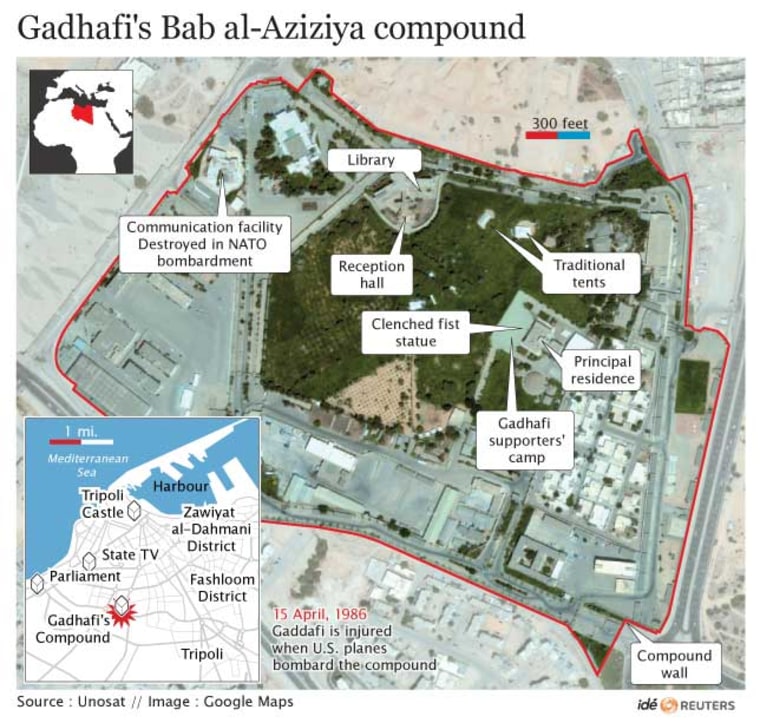Libyan rebels moved to consolidate their control over the country early Wednesday, hours after storming Moammar Gadhafi's fortified Bab al-Aziziya compound in Tripoli.
While stopping short of declaring victory as the besieged dictator vowed on national television to continue fighting, the National Transition Council said it would be in Qatar on Wednesday to organize $2.4 billion in international aid for Libya.
"Now we have to concentrate on rebuilding and healing our wounds," NTC's prime minister, Mahmoud Jibril, said Tuesday.
The council hopes to receive the aid "before the end of Ramadan, so that salaries of Libyans can be paid and medical treatment for those who lost limbs can be provided," Jibril said.
The Muslim holy month of Ramadan ends at the end of August.
Members of the NTC will meet representatives from the United States, France, Italy, Britain, Turkey and Qatar on Wednesday in Doha to discuss the issue, Jibril told a news conference in the Qatari capital.
He said the National Transitional Council would focus on restarting work at oil fields and terminals as quickly as possible. Libya produced about 1.6 million barrels of oil a day before the war started.
Jibril said the NTC also planned to hold a representative national congress soon to decide the make-up of a committee to draft a constitution — among the first steps on the road to presidential elections.
Jibril said he also hoped Libyan assets frozen during the uprising against Gadhafi would be released.
"Unfreezing the assets will be a priority of the transitional government," Jibril said, estimating that there are some $160 billion to $170 billion in frozen assets. "We continue to discover new facts."
The U.S. State Department said on Tuesday it was seeking to release between $1 billion and $1.5 billion of frozen Libyan government assets to the rebels within days if it can secure the blessing of the United Nations sanctions committee.
The money would come from the roughly $32 billion in assets that the United States froze earlier this year, only about one-tenth of which, or $3 billion, is liquid.
A military spokesman for the NTC said he expected the council to move its headquarters to the capital Thursday.
Rebels effectively brought an end to Gadhafi's 42-year rule when they overran his bastion Tuesday, six months after launching their uprising.
However, pockets of fighting continued early Wednesday and forces loyal to Gadhafi shelled Zuara, a Libyan port town about 40 miles from the Tunisian border, Al Arabiya television reported.
Also early Wednesday, Libya's Al-Orouba TV aired a talk by Gadhafi, who said his withdrawal from his Tripoli compound was a tactical move. He vowed to continue fighting NATO aggression until "martrydom" or victory.
Deadliest weapons not corralled
No one can be sure who controls the Libyan government's weapons stockpiles, a stew of deadly chemicals, raw nuclear material and some 30,000 shoulder-fired rockets that officials fear could fall into terrorists' hands in the chaos of Gadhafi's downfall or afterward.
One immediate worry, U.S. intelligence and military officials say, is that Gadhafi might use the weapons to make a last stand. But officials also face the troubling prospect that the material, which was left under Gadhafi's control by a U.S.-backed disarmament pact, could be obtained by al-Qaida or other militants even after a rebel victory were secured.
The main stockpile of mustard gas and other chemicals, stored in corroding drums, is at a site southeast of Tripoli. Mustard gas can cause severe blistering and death. A cache of hundreds of tons of raw uranium yellowcake is stored at a small nuclear facility east of the capital.
Weapons demolition teams hired by the State Department have located and destroyed some of the anti-aircraft rocket systems in rebel-held parts of the country.

U.S. and allied officials say chemical and nuclear stockpiles appear to be still under the control of what is left of the Libyan government despite rebel military advances into the capital. That may or may not be reassuring. It depends on whether Gadhafi loyalists, increasingly desperate, adhere to international agreements not to use or move the material.
The State Department also has sent experts to Libya to confer with rebel leaders and Libya's neighbors about abiding by those same compacts and reinforcing border security to prevent weapons from being smuggled out.
State Department spokeswoman Victoria Nuland said Tuesday the U.S. is working to ensure that "the governing forces in Libya have full command and control of any WMD or any security assets that the state might have had." Jamie F. Mannina, spokesman for the State Department's Bureau of Arms Control, Verification and Compliance, said Libya's known chemical weapons storage facilities have been monitored since the start of the civil war.
On Thursday, senior diplomats from nations of the Libya Contact Group will gather in Istanbul, said State Department spokeswoman Victoria Nuland.
It appears the United States wants to play, at best, a supporting role in post-war Libya, working through the United Nations and global financial institutions like the World Bank.
Bastion overrunThe rebel force entered the compound after fighting for five hours with Gadhafi loyalists outside, using mortars, heavy machine guns and anti-aircraft guns. They beat and killed some of those who defended the compound and hauled away crates of weapons and trucks with guns mounted on the back in a frenzy of looting.
"We're looking for Gadhafi now. We have to find him now," said Sohaib Nefati, a rebel sitting against a wall with a Kalashnikov rifle.
Abdel-Aziz Shafiya, a 19-year-old rebel dressed in camouflage with an rocket-propelled grenade slung over one shoulder and a Kalashnikov over another, said the rebels believe Gadhafi is inside the compound but hiding underground.
"Wasn't he the one who called us rats? Now he is the rat underground," he said.